Granular Computing, 2003 An Introduction The Springer International Series in Engineering and Computer Science Series, Vol. 717
Langue : Anglais
Auteurs : Bargiela Andrzej, Pedrycz Witold

This book is about Granular Computing (GC) - an emerging conceptual and of information processing. As the name suggests, GC concerns computing paradigm processing of complex information entities - information granules. In essence, information granules arise in the process of abstraction of data and derivation of knowledge from information. Information granules are everywhere. We commonly use granules of time (seconds, months, years). We granulate images; millions of pixels manipulated individually by computers appear to us as granules representing physical objects. In natural language, we operate on the basis of word-granules that become crucial entities used to realize interaction and communication between humans. Intuitively, we sense that information granules are at the heart of all our perceptual activities. In the past, several formal frameworks and tools, geared for processing specific information granules, have been proposed. Interval analysis, rough sets, fuzzy sets have all played important role in knowledge representation and processing. Subsequently, information granulation and information granules arose in numerous application domains. Well-known ideas of rule-based systems dwell inherently on information granules. Qualitative modeling, being one of the leading threads of AI, operates on a level of information granules. Multi-tier architectures and hierarchical systems (such as those encountered in control engineering), planning and scheduling systems all exploit information granularity. We also utilize information granules when it comes to functionality granulation, reusability of information and efficient ways of developing underlying information infrastructures.
I - Methodology and Mathematical Framework.- 1 Granular Computing as an Emerging Prardigm of Information Processing.- 2 Sets and Intervals.- 3 Fuzzy Sets.- 4 Rough Sets.- 5 Generalisations of Information Granules.- II — Algorithms of Information Granulation.- 6 From Numbers to Information Granules.- 7 Recursive Information Granulation.- 8 Granular Prototyping in Fuzzy Clustering.- 9 Logic-Based Fuzzy Clustering.- 10 Semantical Stability of Information Granules.- III — Granular World Communications.- 11 Communications Between Granular Worlds: Fundamentals.- 12 Networking of Granular Worlds: Collaborative Clustering.- 13 Directional Models of Granular Communication.- 14 Intelligent Agents and Granular Worlds.- 15 Self-Organising Maps in the Design and Processing of Granular Information.- 16 Temporal Granulation and Signal Analysis.- 17 — Granular Data Compression.- 18 Interval State Estimation in Systems Modelling.- Epilogue.
Date de parution : 10-2012
Ouvrage de 452 p.
15.5x23.5 cm
Date de parution : 11-2002
Ouvrage de 452 p.
15.5x23.5 cm
Thèmes de Granular Computing :
Mots-clés :
Fuzzy; Information; Signal; algorithm; algorithms; calculus; communication; data compression; fuzzy set; intelligent systems; modeling; set theory
© 2024 LAVOISIER S.A.S.
